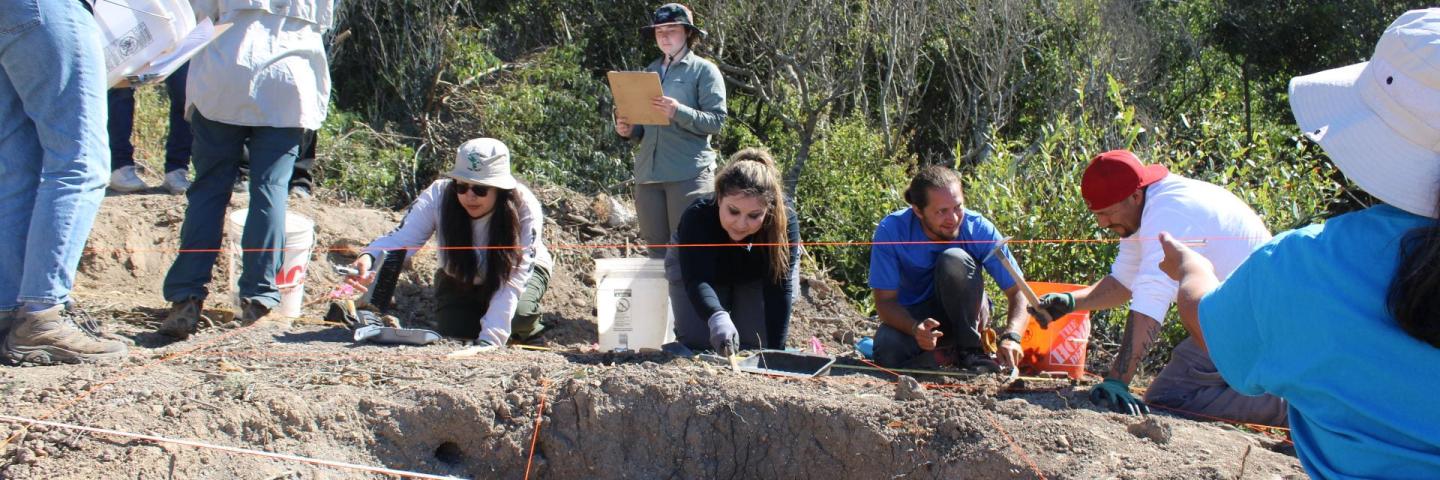Learn collaborative and decolonizing archaeological principles in the field and on the ground.
Join us for an unforgettable field experience co-directed by the University of Oregon Museum of Natural and Cultural History and the Amah Mutsun Tribal Band through their Amah Mutsun Land Trust. Students participating in this field school will be trained in archaeological field methods developed over the last two decades by the Tribe and archaeologists to study and preserve Indigenous cultural heritage in central coastal California.
Applications are for 2025 are closed. Check back next spring for 2026!
COURSE
ANTM 408 / 508: Field Studies in Archaeology
June 23 through July 18, 2025
This summer course is designed to train students in collaborative and decolonizing archaeology

principles. This course teaches students how to conduct archaeological research with diverse stakeholders, including Indigenous peoples, descendant communities, non-profits, and state and federal agencies. Students will be immersed in the complexities of collaborative research based on principles of shared decision-making, reciprocity, power sharing, and centering Indigenous perspectives.
Students can expect to learn about the process of collaborative archaeological research, low-impact field methods, eco-archaeological lab analysis, and Integrative Cultural Resource Survey, a Tribal archaeological assessment program developed by the Amah Mutsun Tribal Band to protect, steward, and study their cultural heritage.
Specific techniques that will be taught include archaeological landscape surveys, ethnobotany, geophysical methods in archaeology, including ground penetrating radar and magnetometry, high-resolution (<1 cm resolution) mapping protocols using GNSS receivers, and collecting, recording, and cataloging archaeological resources. These skills will prepare students for archaeological careers in academic, Tribal heritage preservation, and cultural resource management.
12 credits
INFORMATION
Based in San Juan Bautista, California, our field school will include a variety of museum-based and field-based research, lectures, discussions, and professional development activities. Upon successful completion of the course, students will be able to:
- Conduct collaborative archaeological research projects employing community-based participatory research strategies
- Understand and describe the complexities of conducting collaborative research
- Conduct museum-based research on legacy archaeological collections
- Employ standard archaeological field methods as well as approaches informed by Indigenous cultural practices and protocols, such as low-impact surveying strategies (i.e., “catch-and-release” surface collection, augering, and water flotation of soil samples)
- Understand the advantages and limitations of low-impact archaeological field methods
- Design and conduct landscape-scale survey
- Understand the strengths and weaknesses of various geophysical techniques
- Conduct high-resolution mapping and documentation of archaeological and cultural sites
- Analyze survey data in ArcGIS
Field sessions are open to graduate and undergraduate students. Post-baccalaureate students may register for graduate credit even if they are not yet enrolled in a graduate program.
2025 Course Fees: $4,500
Archaeology Field School students will enroll for 12 credits in ANTM 408/508. A course fee of $4,500, for both in-state and out-of-state students, covers tuition, field transportation, and food. Students that have completed their bachelor's degree may take this course for graduate credit, with the expectation that graduate level effort will be required. Tools and other materials are provided for the course.
Please send questions to Gabriel Sanchez at gsanche2@uoregon.edu.
Health and accidental insurance is required for all students.
Attending the Indigenous Archaeology Field School was one of the best decisions I have ever made. The four-week course spanning the Santa Cruz coastline provided me with all the practical skills necessary to succeeding outside of college, from low-impact methods of surface collection to in-depth excavation on an active excavation site. The course provided me with confidence to know I can thrive in the field.
The course instructors, Dr. Alec Apodaca and Dr. Gabriel Sanchez, are consummate professionals who are constantly striving to push for higher levels of excellence in their students. In addition to this, they are sincerely good people who aided me in the field and led me in the right direction whenever I felt lost (literally at times).
My cohort came from a variety of backgrounds and brought their individual skills that made the whole school experience that much more enriching. Weekly lectures paired with the collaborative nature of our work with the Amah Mutsun Tribal Band granted an opportunity to open our minds to new ways of thinking about archaeology and the world as a whole. I give my full recommendation to attend the Indigenous Archaeology Field School. The opportunity to collaborate with Tribal Members and be included on the cutting edge of archaeological field methods is a once-in-a-lifetime opportunity and has led to my full resolve to seek a career in archaeology.
Joseph Ali’i Ordoño Cruz, Indigenous Archaeology Field School 2024, Post-Baccalaureatte
San Francisco State University, Department of Anthropology
Attending the Indigenous Archaeology Field Methods Field School was one of the most rewarding experiences I had in college. The month-long program provided me with foundational skills in surveying, excavating, recording, and collecting archaeological data and materials. These skills are essential for someone interested in entering CRM. Most notably, I learned the importance of collaborative archaeology methods and research as we worked alongside members of the Amah Mutsun Tribal Band. This field school has inspired me to continue archaeology work on the West Coast alongside tribes interested in working with archaeologists to learn more about their past through collaborative archaeology methods. This field school provides a unique opportunity for students as we visited several archaeological sites on the Coast, working side by side with Tribal members and learning about the colonial history in California and the effects colonialism had on California tribes. I recommend applying to and attending this field school if you are looking to advance your experience in archaeological methods and skills and better understand collaborative archaeology methods.
Eva Perry, Indigenous Archaeology Field Methods Field School 2024, Recent Graduate, Department of Anthropology, University of Oregon
I attended the Indigenous Archaeology Field Methods and Field School in the summer of 2024. Through attending this field school, I was able to gain the skills to prepare me for entering the field of archaeology. However, what made this field school a unique and special experience was the ability to engage in truly collaborative archaeology. For four weeks, we lived and worked in community with The Amah Mutsun Tribal Band. We collaborated in the field, worked on projects, and learned what it means to be a steward of the environment, all while gaining valuable knowledge about the Central California coast and its past. The field of archaeology is changing, and if your desire is to attend a field school that will prepare you for real world archaeology, while simultaneously making connections and friendships that will last a lifetime, look no further. Under the guidance of Dr. Gabe Sanchez, Dr. Alec Apodaca, and the Amah Mutsun Tribal Band, I was able to grow both as an archaeologist and as an individual. I learned the importance of approaching archaeology from a holistic perspective, considering the scientific and academic approaches to archaeology, as well as maintaining a great respect and compassion for the people of the past. This is a unique skill set you would not learn at just any field school and I would highly recommend the Indigenous Archaeology Field Methods and Field School to anybody interested in pursuing archaeology.
Camy Corcoran, Recent Graduate, University of Oregon
I am so grateful for the time I spent at the Indigenous Archaeology Field Methods Field School. Gabe and Alec were wonderful instructors and I feel blessed to have gotten the opportunity to study under them. My fellow students were also very friendly and made me feel at home right away. We learned a variety of archaeological methods and now that I am employed as a professional archaeologist I can say that the skills we learned have directly translated into the field of cultural resource management. I really appreciated the opportunity to visit various sites and work with professional archaeologists from different backgrounds. The campfire lectures were also amazing and they brought in lecturers (such as the legendary Dr. Kent Lightfoot) that supplemented the hands-on, practical training we received each day.
Trevor Vicars, Archaeologist at Stantec
Department of Anthropology, University of California, Berkeley
Doing the field school was extremely rewarding to me. It gave excellent opportunities to not only learn, but also engage in a very wide range of archaeology field methods. In addition, the work with the Amah Mutsen showed me how important this line of work can be, and how archaeology can help reconnect people to their ancestors. The field school was also very fun for me, even if some days were pretty tough. I loved how much we got to get our hands dirty in the field. The other participants in the field school were very friendly, some of the connections I made during the field school have turned into strong friendships after we got back. After getting back to school the following fall, I was able to join Dr Sanchez’s labs working through the samples we brought back with us, which has been a rewarding experience of its own.
Derrik Schmidt, University of Oregon
The Museum of Natural and Cultural History is delighted to offer the C. Melvin Aikens Scholarship for the 2025 field school to contribute to students' tuition to attend. Selection of this award will be on a needs-based evaluation. If you would like to be considered for this award, please provide a statement of need that explains how receiving the C. Melvin Aikens Scholarship will affect your ability to attend.
Applications for 2025 are closed.
The application for field school includes some specific questions that we recommend preparing in advance of filling out the application. Questions include:
- Include any plans you may have to pursue archaeology as a career and your current academic status (e.g., freshman, junior), if applicable. In addition, please provide a short response about why you think archaeology is an important field of science and what are the strengths and weaknesses of the current discipline as you perceive it. This statement is required and must contain ~500 words.
Questions? Email gsanche2@uoregon.edu
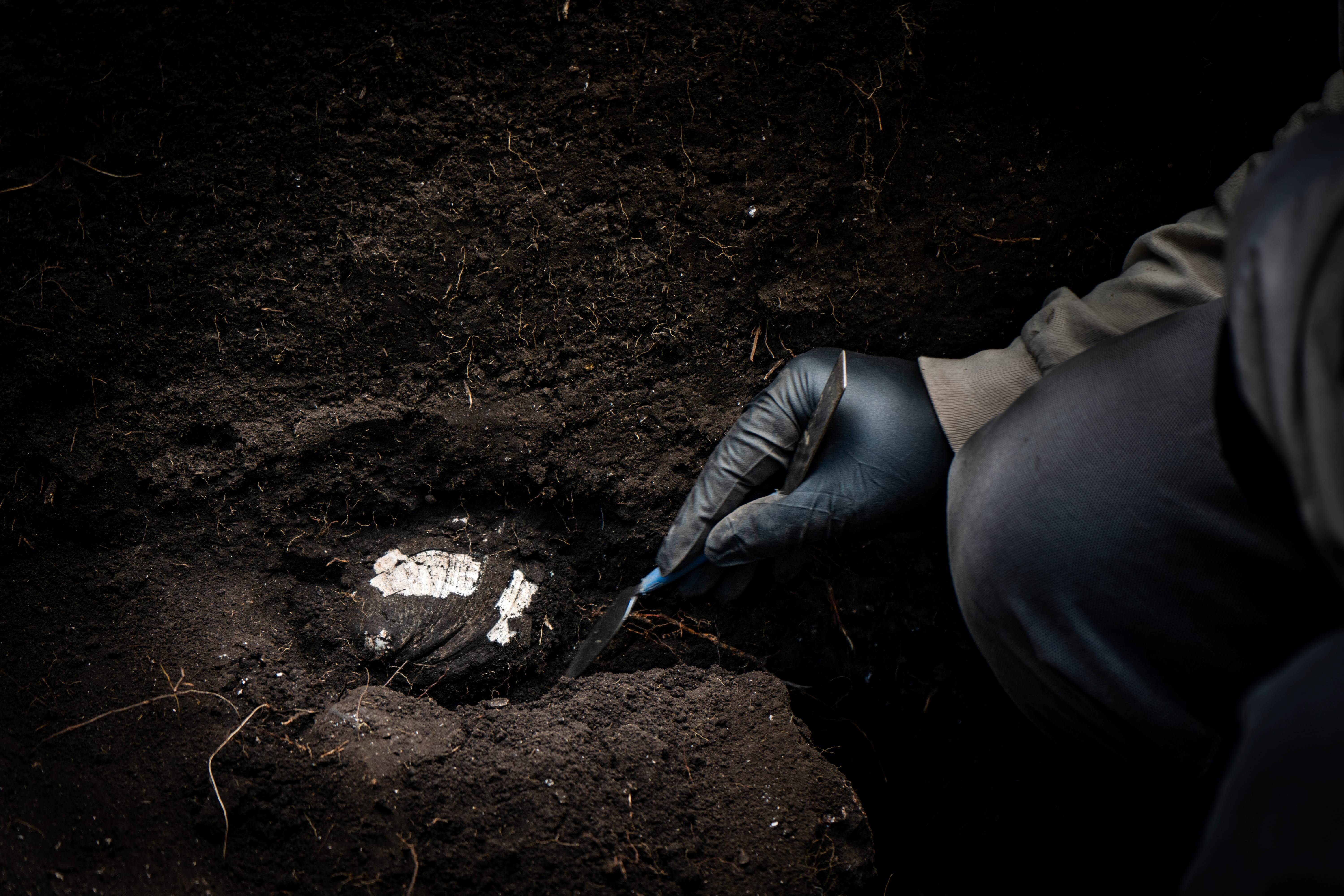
Lupe Delgado excavating abalone in situ (2023). Photo by Orenda Randuch.
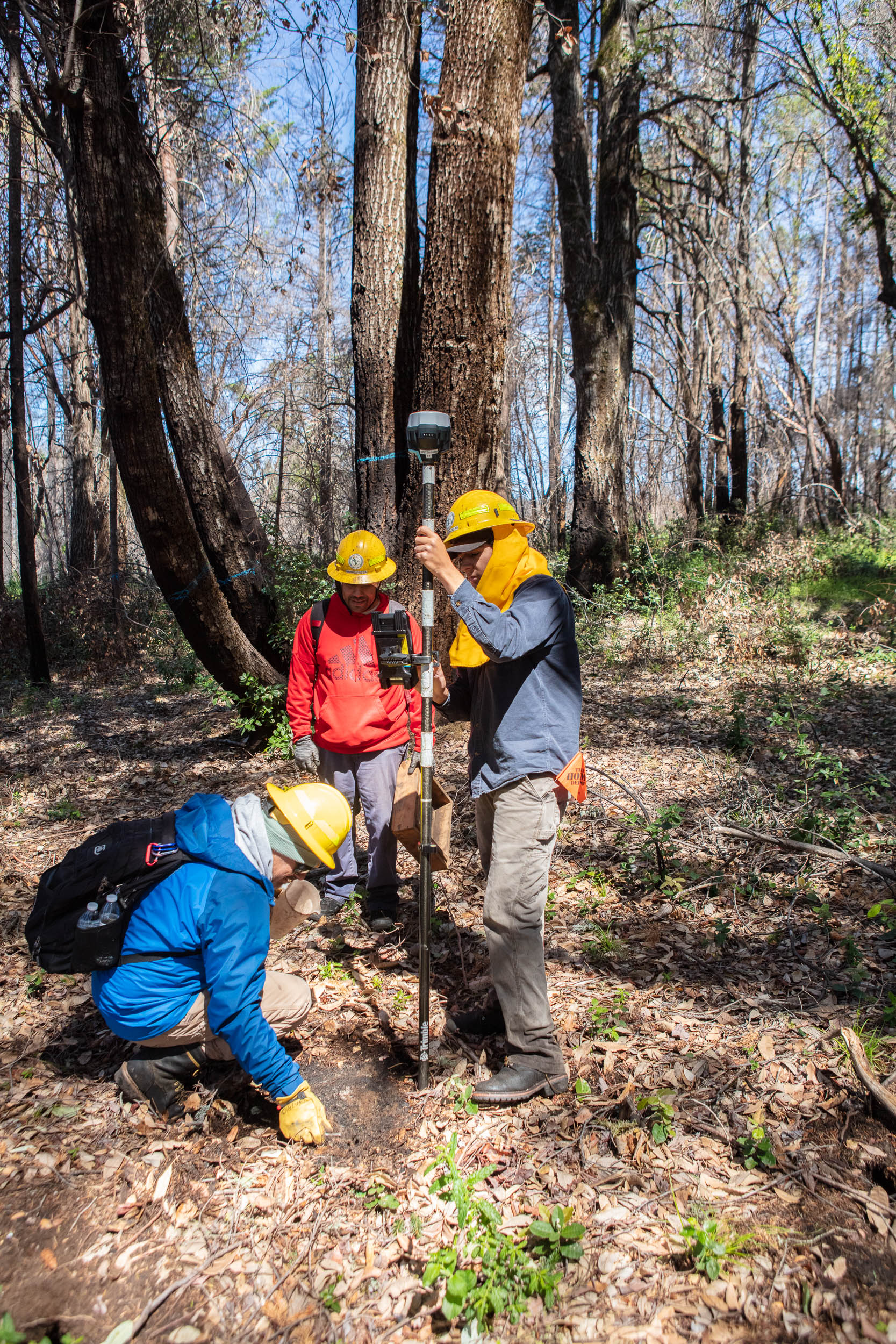
Surveying in the field (2023).
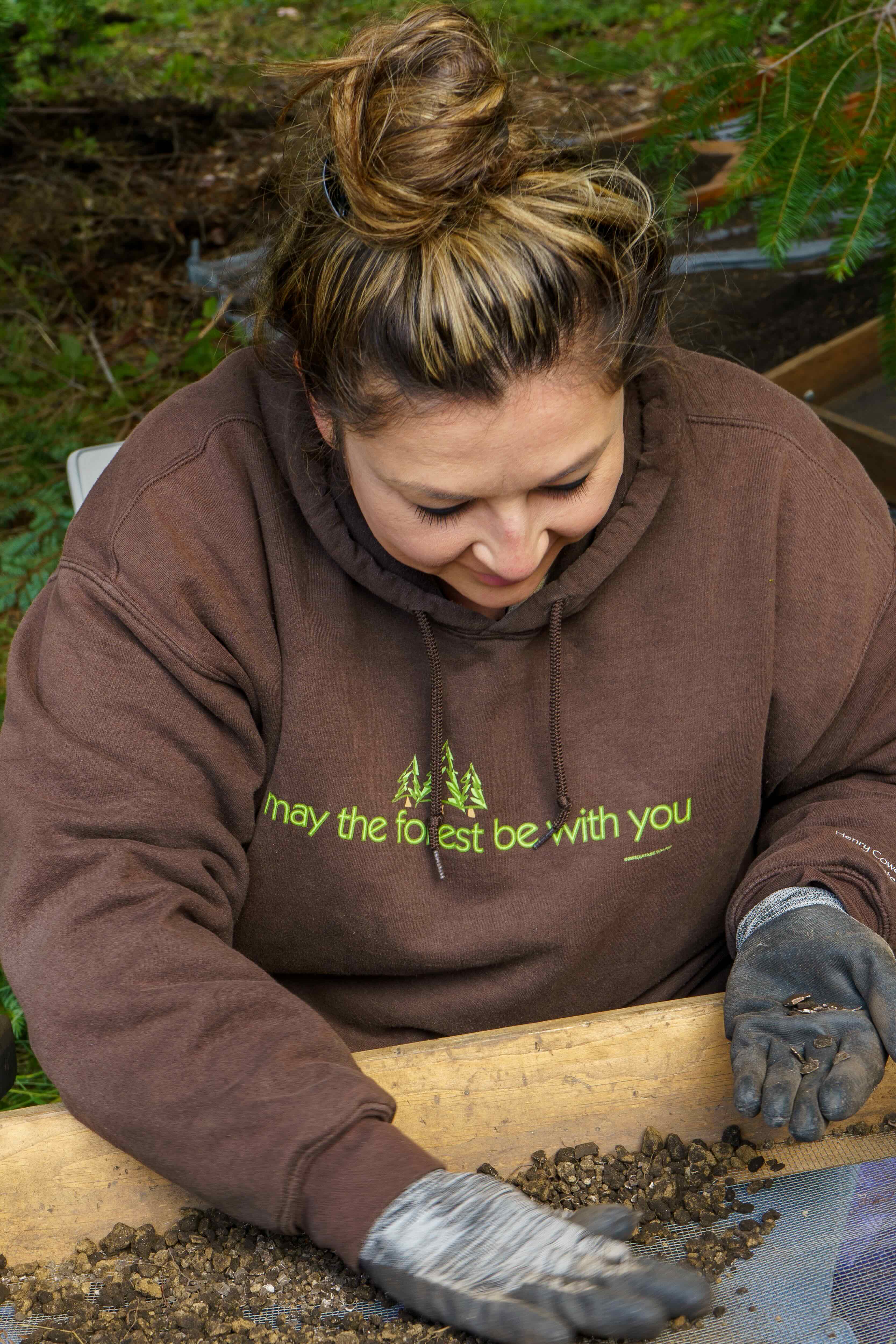
Marcella Luna sorting from the screen. Photo by Orenda Randuch.

Students relax in the 2024 field school campground.
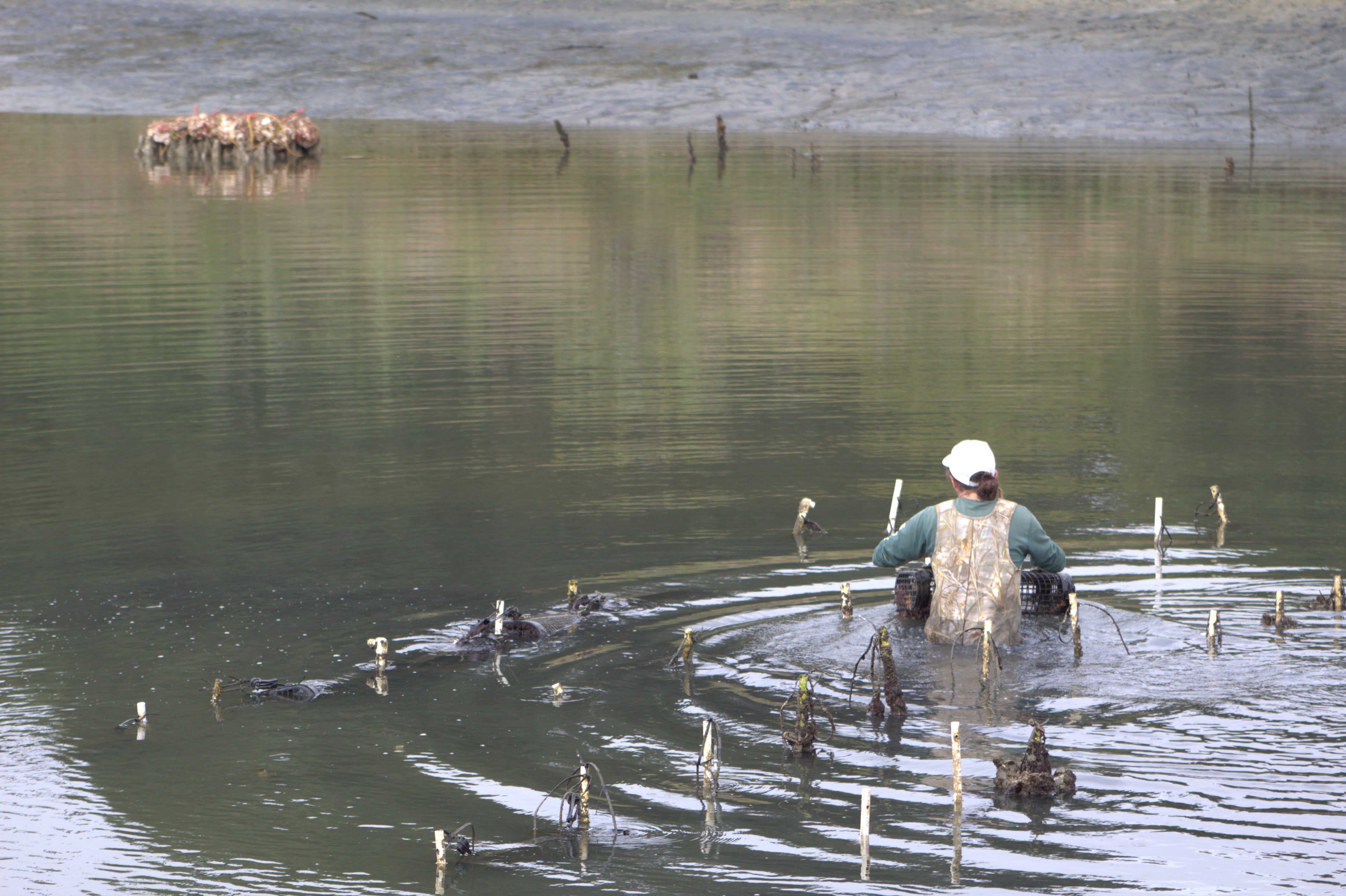
An archaeologist wades into Elkhorn Slough.
Safety Protocols
2025 field school plans and safety protocols are subject to change based on guidance from the University of Oregon and the Oregon Health Authority.
